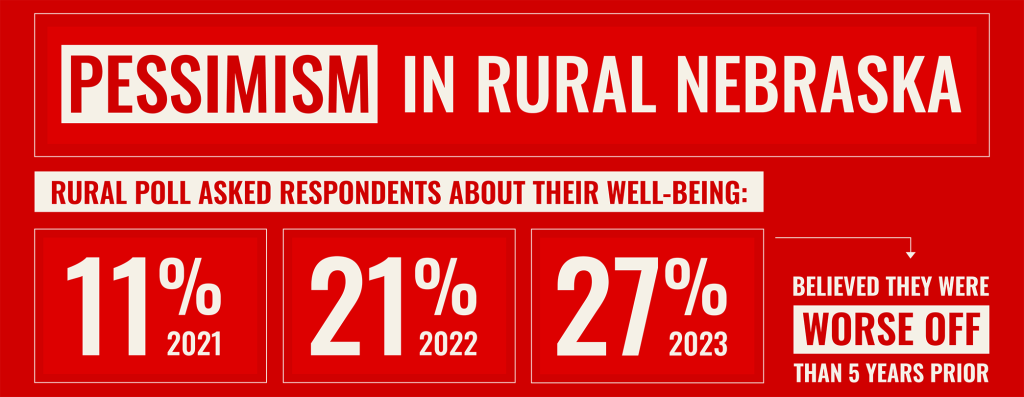Becky Vogt, September 19, 2023
Poll: Rural Nebraskans are increasingly pessimistic about present, future
Rural Nebraskans are increasingly pessimistic about their current and future well-being, according to the 2023 Nebraska Rural Poll.
Over the past 28 years, the Rural Poll has asked respondents about their current well-being and outlook on their future. This year, 27% of respondents indicated they are worse off than they were five years ago, up from 21% last year and 11% in 2021. This is the highest level since 2009, when 28% believed they were worse off.
The increase in pessimism was matched with a decrease in optimism. This year, 45% of rural Nebraskans surveyed believe they are better off compared to five years ago, down from 50% last year.
Rural Nebraskans’ optimism about the future has also trended downward over the past four years. Thirty-nine percent of respondents believe they will be better off 10 years from now. This has steadily declined from 52% in 2019, the highest proportion across all years of the study. Similarly, the proportion stating they will be worse off in a decade increased from 22% last year to 27% this year.
Despite increasing pessimism, more respondents believe they are better off compared to five years ago than say they are worse off (45% compared to 27%). This is also true of their long-term outlook: 39% say they will be better off 10 years from now, compared to 27% who believe they will be worse off.

“Although I was expecting more positive trends in optimism as we continue to move on from the disruptions associated with the COVID-19 pandemic, these results would indicate that’s not the case,” said L.J. McElravy, associate professor of agricultural leadership, education and communication at the University of Nebraska–Lincoln. “Rural Nebraskans are more pessimistic and less optimistic about the future in comparison to previous years. However, I still see signs of hope, as we continue to see higher levels of optimism in relation to pessimism.”
Certain groups are more likely to be optimistic about their current situation and future. Younger people, as well as those with higher household incomes and levels of education, are most likely to believe they are better off compared to five years ago and will be better off 10 years from now, according to the Rural Poll.
In addition, most rural Nebraskans surveyed describe their mental health or emotional well-being as good (55%) or excellent (28%). While income was also related to positive reports of mental health, the age trends were opposite of those for well-being. People aged 40 and older are more likely than younger people to report their mental health as being good or excellent, according to the poll.
“Rural Nebraskans’ assessments of their mental health are slightly better than those of all Americans,” said Becky Vogt, Rural Poll manager. “While the proportion rating their mental health as excellent was about the same as those found in a nationwide Gallup poll, more rural Nebraskans rated their mental health as good. And the age and income differences we see here in rural Nebraska are also present across the nation. Although our younger persons are less likely than older persons to rate their mental health as good or excellent, they still reported higher assessments of their mental health when compared to the nationwide younger population.”
The trend toward pessimism might stem from perceptions of the economy. While many rural Nebraskans are not optimistic about the economy in the next year, they are less pessimistic than they were last year. This year, 70% or more of respondents indicated they expected grocery prices, inflation, housing costs and interest rates to rise. However, only about a quarter of respondents said they expected significant increases in prices, inflation and interest rates, compared to nearly half of respondents in 2022.
When looking at workforce issues, most respondents are confident that completing an apprenticeship program, having an associate’s degree or certification, or having a bachelor’s degree are all paths to a good job. However, 90% agreed that completing an apprenticeship program could lead to a good job, while 70% agreed that an associate’s or bachelor’s degree could lead to a good job.
“While there have been some improvements in the labor supply, this is still a tight market with employers focused on recruiting high-performance employees,” said Steve Schulz, associate professor of logistics and supply chain management at the University of Nebraska at Omaha. “In general, apprenticeship programs are focused on new entrants to the workforce, with the goal of improving productivity with the workforce that becomes available. Training, education and experience will all be needed to develop the workforce of the future. A high-skilled workforce will be the key to success for many organizations in rural and urban areas.”
The Rural Poll is the largest annual poll gauging rural Nebraskans’ perceptions about policy and quality of life. Questionnaires were mailed to more than 6,000 households in Nebraska in late spring and summer, with 1,100 households representing 86 of the state’s 93 counties responding. The margin of error is plus-or-minus 3%. The University of Nebraska–Lincoln’s Department of Agricultural Economics conducts the poll with funding from Nebraska Extension. For the full report, click here.





